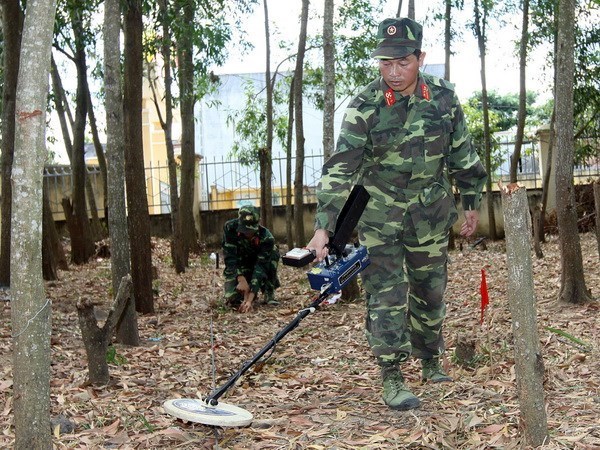
Several foreign-funded projects have been conducted in the central province of Quang Tri over the past two decades, helping the locality to clear bombs and mines left from war.

Sappers are
searching for war-left bombs and mines (Source: VNA)
Quang Tri is one of localities most affected by the aftermath of
war, with 81 percent of the province’s total area polluted with unexploded
ordnance (UXO).
Statistics from the provincial centre for overcoming bomb and mine consequences
show that by April 2018, bomb and mine accidents had killed 3,430 people and
injured 5,100 others, including many children.
Demining projects in Quang Tri have been funded by many foreign agencies,
including the foreign ministries of Germany, the US and Norway, the
Federal Ministry of Economic Cooperation and Development of
Germany, the UK’s Department for International Development, Ireland’s
development assistance fund, UNICEF and the US organisation Peace
Trees.
The projects have helped clear 132 million sq.m of seriously polluted areas,
and safely handle more than 650,000 bombs, mines and other UXO.
More than 350,000 people were provided with knowledge and skills to prevent UXO
accidents via the "Mine Risk Education (MRE)” programme.
Local authorities have also paid attention to supporting local victims of
war-era UXO, helping them improve their living conditions and re-integrate
into the community.
Non-governmental organisations have financed the building of 332 humanitarian
houses, and directly aided 215 UXO victims and their families.
Some 1,200 UXO victims who are living with disabilities were provided with
medical examination and prosthetics and other orthopedic instruments, while 50
disabled people and medical workers were trained in community-based
rehabilitation.
Nguyen Duc Thien from the provincial centre for overcoming bomb and mine
consequences said demining projects have contributed to expanding safe
land area for production in the locality.
To improve the work, the locality will set up a mine action centre, he said,
adding that Quang Tri hopes to receive greater support and resources for the
scheme.-
Source: VNA
More than just an information technology teacher, Bui Van Nien is an inspiring figure who has nurtured the scientific curiosity and creative spirit of students in Vietnam’s ethnic minority communities.
Da Bac is the most disadvantaged mountainous district in Hoa Binh province, with ethnic minorities accounting for about 90% of its population. Over the past years, the district has mobilised resources to implement ethnic policies to improve the quality of life of local people.
In recent years, Hoa Binh province has consistently prioritised the protection, care, and education of children, particularly those from ethnic minorities and disadvantaged backgrounds, by creating a safe, healthy, and nurturing environment for their all-round development.
The Steering Committee for Tobacco Harm Prevention and Control of Hoa Binh province, in coordination with the Tobacco Harm Prevention and Control Fund, held a ceremony on May 28 in response to the World No Tobacco Day (May 31) and the National No Tobacco Week (from May 25 to 31). The event was chaired by Nguyen Van Toan, Standing Vice Chairman of the provincial People’s Committee and head of the Steering Committee.
Since 2021, the Center for Industrial Promotion and Industrial Development Consulting (CIIDC) under the Department of Industry and Trade has been implementing a school lighting model as part of the plan for using energy efficiently and economically in Hoa Binh Province in the pẻiod of 2021 - 2025. This model not only aims to improve the learning conditions and enhance the education quality, but it also promotes the message of energy saving, energy security, environmental protection and contributes to the goals of socio-economic development.
In the 2024 - 2025 school year, the entire Hoa Binh provincial education sector includes 520 educational institutions and schools. Among them are 13 ethnic boarding schools with 153 classes and 4,487 students. Four of these schools have met national standards, reaching 30.7 percent.



